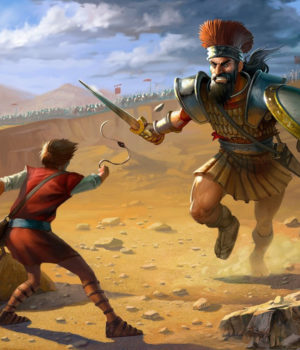Start-ups and big brands are like the Davids and Goliaths of the business world.
One is small, agile, and full of energy; while the other is a solid structure that’s not easily crushed or taken down.
While on first glance they might seem completely different, each has a lot to learn from the other.
What start-ups can learn from big brands
The one thing that sets start-ups apart from big brands is flexibility. However, this strength may be attributable to a start-up’s nature, which is basically being ‘low on numbers’. They haven’t yet had to cope with the challenges or expectations springing from having a rigid structure, a big workforce, or a well-known identity.
Of course, every start-up dreams of becoming big – but start-ups shouldn’t wait to become ‘big’ to act like grown-ups.
Establish a structure
New companies are often excited to get started on whatever product they want to launch, and can end up losing sight of the operations and processes that are essential when starting a business.
More established companies already have fixed processes in place to ensure that everything is running smoothly. Similarly, stable and reliable processes should be the goal for every start-up.
Start-ups should:
- Invest in productivity apps and project management tools.
- Appoint someone to keep an eye on the balance sheet.
- Document, document, document!
Embrace your staff
Cliché as it may sound, a start-up’s most valuable asset is its staff. So it’s vital to let them know how much they are valued.
Understandably, big businesses can offer the most generous compensation packages in the industry — for instance, the best healthcare and the latest technologies that enable employee productivity.
Small businesses may not have the means to provide at the same level, but how about tapping into employees’ desire for work flexibility, or offering them some equity in the business?
Most importantly, show your employees that you value them not just through words, but also by action. Employee motivation is not all about extrinsic rewards, but intrinsic factors too.
Be clear about who you are
Many start-ups want to do too much, too soon. To get to where strong brands are, start-ups should focus on their own strengths before expanding to other specialties.
Of course, all these efforts can be quite useless if word doesn’t get around. Fortunately, in the age of social media, you can promote your brand on exactly the same platform as the big brands. Tell a story about your brand through a series of videos, or create a hashtag campaign.
What big brands can learn from start-ups
Despite having many years of experience under their belts, big brands still have quite a lot to learn from start-ups. Here are some of the most important lessons big brands can take from their smaller, newer counterparts.
Don’t lose sight of your foundations
Sure, major brands are big for a reason. But with ‘bigness’ comes the tendency to lose sight of the reason why the brand exists in the first place.
Start-ups may still be struggling to let the world know about what they can offer, but their sense of purpose is fresh — in fact, it keeps their flame burning. By going back to their roots, big brands can reawaken the same level of passion.
Foster trust
A friendly, non-hierarchical work environment attracts top talent to start-ups. Things that may seem simple tend to be easily overlooked, such as having an open-door policy, discouraging overtime, and giving employees the option to work from home.
Remember: having a healthy work environment is good not only for your employees but for your business as well. Happy employees are more productive, more inspired, and less likely to miss work.
Learn from everyone’s mistakes
Running a business is a mix of trial and error. It’s about learning from mistakes — your own and those of others — and learning as you go.
From competitors to companies bigger and smaller than your own, you can always pick up that which inspires you. Accept that you’re never going to have it all figured out, and that’s the beauty of it. You’re in a state of constant learning, no matter how big or small.
Jamie Shostak is co-founder of Appetiser Apps, Australia’s fastest growing app development agency. At 24 years, this is Jamie’s second company. He founded Webhype at 19 and was turning over half a million dollars in annual revenue. Currently Head of Growth at Appetiser, Jamie’s leading a team of over 100 who are winning awards like the Deloitte’s 2019 Fast 50, Young Entrepreneur of the Year and many others.







![Need more leads? Here are five strategies [FREE DOWNLOAD]](https://anthillonline.com/wp-content/uploads/2016/04/james-FIVE-SIMPLE-STRATEGIES-TO-GET-MORE-LEADS-01-06.pdf-Box-2016-05-13-15-49-32-100x75.png)

![Learn how to generate more leads in one month than most competitors would in one year! [FREE REPORT]](https://anthillonline.com/wp-content/uploads/2015/08/Capture4-100x75.jpg)
![How to build a retail empire with James Webber [FREE REPORT]](https://anthillonline.com/wp-content/uploads/2015/06/james-webber-instagram-memes-01-100x75.jpg)
![Instagram for Business… in 12 steps [FREE INFOGRAPHIC]](https://anthillonline.com/wp-content/uploads/2015/08/Capture7-100x75.jpg)

![How to have your own signature move: personal branding 101 [VIDEO]](https://anthillonline.com/wp-content/uploads/2014/08/Zaphod-300x350.jpg)
![What’s not to like? A charity ad that does just about the impossible [VIDEO]](https://anthillonline.com/wp-content/uploads/2012/11/SarahSilverman.jpg)
![How does YouTube recommend videos that you may like to watch? [VIDEO]](https://anthillonline.com/wp-content/uploads/2014/05/ComputerPhile-300x350.jpg)
![Why startups and entrepreneurs continue to freak out traditional businesses [VIDEOS]](https://anthillonline.com/wp-content/uploads/2013/08/Innovate-300x350.jpg)
![Strategic Alliances with Simone Novello [FREE INFOGRAPHIC]](https://anthillonline.com/wp-content/uploads/2015/08/Capture6-300x194.jpg)
![The Ultimate Social Media Almanac with James Tuckerman [Cheat Sheet]](https://anthillonline.com/wp-content/uploads/2015/11/Screen-Shot-2015-11-26-at-11.24.55-100x75.png)
![Want more credibility and influence? Unlock the 12 principles of persuasion checklist [FREE DOWNLOAD]](https://anthillonline.com/wp-content/uploads/2016/03/james-persuasion-and-influence-nfsu-02.pdf-Box-2016-03-24-15-09-44-100x75.png)
![THE ULTIMATE CASHFLOW CHECKLIST [FREE DOWNLOAD]](https://anthillonline.com/wp-content/uploads/2016/06/james-Seven-simple-strategies-to-cut-costs-04.pdf-Box-2016-06-30-13-49-35-100x75.png)

![New Zealand’s Xero eyes US IPO, further disruption as subscribers increase [INFOGRAPHIC]](https://anthillonline.com/wp-content/uploads/2014/07/sruuuuujana-212x194.png)
![Ever wonder if your ‘content marketing’ is really just crap? You gotta see this! [INFOGRAPHIC]](https://anthillonline.com/wp-content/uploads/2014/08/content-100x75.jpg)
![7 Business Lessons From Game of Thrones [INFOGRAPHIC]](https://anthillonline.com/wp-content/uploads/2014/10/infographic-games-of-thrones-041-100x75.jpg)
![How to build your own Media Empire… In seven steps with Nathan Chan [INFOGRAPHIC]](https://anthillonline.com/wp-content/uploads/2014/10/Nathan-Chan-Infographic-e1413419529176-100x75.jpg)
![5 Business Lessons From Tinder [INFOGRAPHIC]](https://anthillonline.com/wp-content/uploads/2014/10/Tinder-Elegant-Infographic-100x75.jpg)



